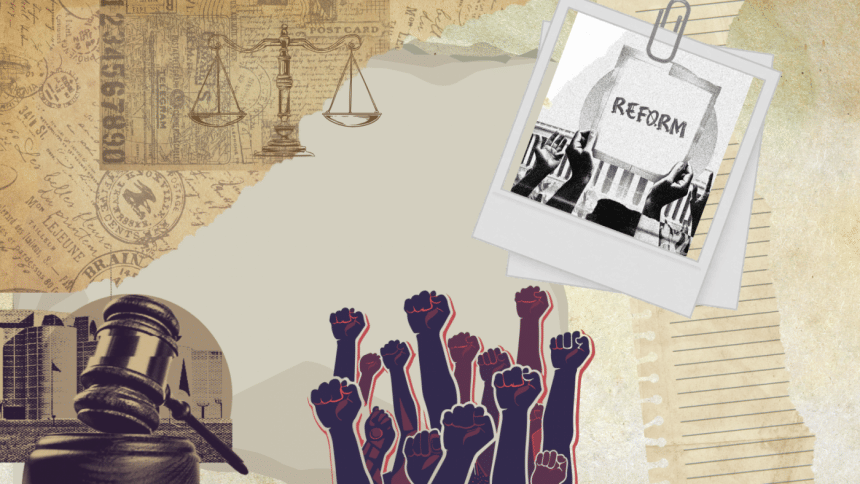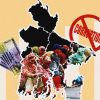Why our policies must be backed by evidence

In the rapidly evolving political landscape, Bangladesh is presented with an unprecedented opportunity to reconfigure and functionalise its institutions and processes. This opportunity, often referred to as the "reform agenda," arises from a growing demand for a "new political settlement," based on the people's desire for stronger participation in governance and policymaking. This, in effect, is a call for a cultural shift that requires policymaking to be inclusive and evidence-based.
In the world of work, the value of evidence-based decisions cannot be overstated. Governments and organisations globally have adopted data-driven decision-making as a primary strategy to navigate through biases and accelerate progress by reducing wasteful expenditure. As Bangladesh finds itself at the critical juncture of a political and cultural behavioural shift, it is crucial to understand the importance of evidence-based policymaking in its quest to maintain its growth trajectory.
Bangladesh has an established culture of policy-based evidence-making, with evidence being selectively used to justify or support a pre-existing political agenda. The lack of evidence in formulating decisions means that any decision taken is largely supported by political dynamics, economic interests, and administrative pressure, thereby losing the objectivity necessary for improved policy formulation. This has also led to the selective creation and use of superficial data to support the political narrative, creating a culture of misinformation and ignorance.
To this end, an Evidence Unit established at the Chief Adviser's Office could serve as a transformative institution. An Evidence Unit, as the name suggests, is a dedicated entity within the government that would focus on the analysis and dissemination of high-quality evidence to inform policy decisions. The unit can serve as an integral part of the policymaking process by ensuring decisions are based on available data in an objective manner.
An institutional framework for evidence from the highest level of government will also pave the way for improved understanding and respect for evidence within different agencies and ministries. It will allow for better coordination on issues requiring cross-agency collaboration. For instance, as Dhaka battles its worst-ever air quality, the remedy requires a synchronised approach among responsible government agencies working on the environment, power and energy, roads and transport, etc. For far too long, this coordination has been left at the mercy of a proactive initiator or awaited strong public resentment and media coverage to force concerned agencies into action.
However, an Evidence Unit can work as the coordinator and tracker for these policy concerns, providing data-driven recommendations to address these challenges. This harmonisation of policy across government ministries and departments will support the development of a unified reform agenda, reducing redundancy and wasteful expenditure.
The expectations of a "new political settlement" also focus on increased participation of the people, particularly the youth, in state governance. To this end, a noticeable phenomenon recently has been the alteration of policies based on social media outcry, often creating mistrust and public dissatisfaction with government initiatives. Evidence-based policymaking is of paramount importance to make decisions that are more decisive, inclusive, discernible, debatable, and fact-based. The political actors in this process should also recognise that giving precedence to evidence in everyday decision-making demands steadfast political commitment.
The proposition for establishing an Evidence Unit stems from the need for a unified knowledge hub within the government mechanism that bridges the gap between academia, development organisations, and researchers. This would allow authoritative information and expert views to be utilised in the country's policymaking process.
Several countries have long benefited from taking this approach to policymaking. The What Works Network in the United Kingdom has been instrumental in supporting the government by improving how government and other public sector organisations "create, share, and use" high-quality evidence in decision-making. Likewise, the Government Policy Analysis Unit in Finland and the Productivity Commission in Australia are all effective institutions that have institutionalised evidence-driven governance.
The What Works Network, established in the United Kingdom in 2013, has been an integral part of the British legislative system. The network not only focuses on the pertinent question of "what are the available options" but also addresses the important question of "how?" It identifies several well-tested and effective interventions, ensuring optimum planning and resource allocation, providing cost-benefit analyses, and identifying whether policies are likely to deliver their intended benefits. For example, the Education Endowment Foundation, one of the institutions under the Network, provides educational institutions with resources to improve the quality of teaching and learning by summarising evidence on the most effective educational practices. This is particularly important for a country like Bangladesh, where several streams of the education system have somewhat reinforced societal divides, institutionalised skill disparity, and facilitated prestige gaps in some cases.
The social fabric of Bangladesh is at risk of being blemished by the mistrust created by years of ineffective and disengaged policy decisions. The Evidence Unit can serve as a facilitator to maximise the returns of impactful research and data and instil objectivity and confidence in the government machinery. It will also serve as a repository for the plethora of research and information being generated globally on policy matters. Therefore, as we move forward with the reform agenda, it is indispensable for policymakers to acknowledge the role of evidence in policy formulation and embrace this behavioural shift.
Barrister Abir Chowdhury is a non-practicing lawyer. He can be reached at [email protected].
Views expressed in this article are the author's own.
Follow The Daily Star Opinion on Facebook for the latest opinions, commentaries and analyses by experts and professionals. To contribute your article or letter to The Daily Star Opinion, see our guidelines for submission.

 For all latest news, follow The Daily Star's Google News channel.
For all latest news, follow The Daily Star's Google News channel. 










Comments